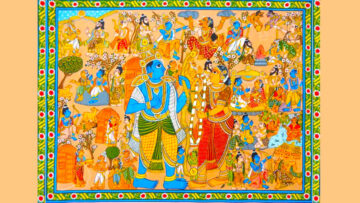The rich tradition of literature in Bharatiya regional languages has played a pivotal role in fostering national consciousness and integrity among the populace over centuries. Among these literary traditions, Kannada literature, with its nearly 2500-year history, stands out for its profound contributions towards nurturing Ratriya Prajna (national consciousness) among the populace. Over the ages, Kannada literature has served as a powerful medium for expressing and reinforcing the shared values, ethos, and aspirations of Bharat, contributing immensely to the collective identity and sense of belonging. From ancient classics to modern works, Kannada writers have consistently reflected upon societal issues, cultural heritage, and the quest for a collective identity, thereby fostering a sense of pride and unity among nationals.
Kannada writers continue to uphold this tradition even today. “Yahudi: Israel Nadedu Banda Ranarochaka Nettara Hadi,” authored by journalist and writer Srikanth Shetty Karkala, exemplifies the contemporary Kannada literature being produced. This book narrates the story of Jewish civilization and its enduring legacy. Despite constituting less than 0.2% of the global population, the Jewish community’s resilience against adversities and their cultural renaissance serve as inspiration to all humanity. They have made significant contributions across diverse fields including finance, science, agriculture, medicine, and defense. “Yahudi” delves deeply into each of these domains, offering readers profound insights and perspectives.
“Abraham” is regarded as the founder of the Jewish faith and the ancestor of Semitic tribes. His story serves as a link between Jewish history and Middle Eastern mythology. One day, God called upon Abraham and during this encounter, discussed two key concepts with him. Firstly, God convinced Abraham of His true identity as the one and only God, and then provided guidelines for establishing a connection with Him. Through this covenant, Abraham became the first Jew in history. Muslims refer to Abraham as Ibrahim. Abraham’s son is Isaac. One day, God unexpectedly appears on a hill in Jerusalem and asks Abraham to sacrifice his son, Isaac. When Abraham hears this command, he is deeply shocked. Despite his strong devotion to God, he is torn by the request to sacrifice his only child. Nevertheless, Abraham chooses to obey God and takes Isaac to the mountain, relinquishing his attachment to his beloved son. It is widely understood that God asked Abraham to sacrifice Isaac only as a test of his faith.
Because of Abraham’s unwavering devotion, God was pleased and promised his descendants the land of Canaan. Isaac was Abraham’s son, and Jacob was Isaac’s son. One night, as Jacob was walking in Canaan, he encountered a mysterious individual who challenged him to a fight. Jacob accepted the challenge, and they wrestled throughout the night. At dawn, Jacob noticed that his opponent had wings, revealing him to be an angel. Impressed by Jacob’s determination and skill, the angel bestowed upon him the new name “Israel,” which signifies “one who has struggled with God” or “one who has prevailed.” The rivalry between the descendants of Jacob (Israel) and other races continues to this day. It is crucial to carefully examine the historical layers of Israel to gain a deeper understanding of the country’s current situation. Can the Jewish civilization overcome its challenges solely through diplomatic relations, policy formulation, and international cooperation? Or are there deeper underlying factors that need consideration?
The second half of the book recounts several remarkable and vivid tales of the Jewish people, while the first half explores the origins of their journey. Throughout world history, Jewish civilization has often been the target of ethnic conflicts, having been immersed in conflict from its inception. One could argue that the Holocaust perpetrated by Hitler represents the largest genocide of Jews in recent memory. Over six million Jews were brutally murdered during World War II, from approximately 1941 to 1945. It was believed unlikely that the community would ever fully recover from this tragedy, yet remarkably, the Jews managed to rejuvenate themselves like a phoenix rising from the ashes. The first major conflict that resulted in significant Jewish casualties occurred during the war between Rome and the Jews, which commenced in 132 AD under Hadrian’s rule. Over the subsequent centuries, the civil strife escalated. Later centuries saw further conflicts such as ‘The Great Constantine’s’ Christian clash, which also led to Jewish genocide. In hindsight, periods of history were marked by significant conflict between Christians and Jews. Subsequently, the emergence of Islam around 622 AD brought about new conflicts. The book also provides a comprehensive overview of the political, social, and religious transformations unfolding in the Middle East.
A pandemic known as the “Black Death,” similar to the coronavirus, struck Europe in 1346, causing horrific casualties that led to the deaths of more than half of Europe’s population at the time. Sadly, Jews were unfairly blamed for this outbreak, resulting in unjust persecution. In response to enduring centuries of historical blows, the Zionist movement emerged in 1896, advocating for the creation of a Jewish homeland. Finally, on May 14, 1948, their aspirations were realized with the establishment of Israel. However, this achievement was not without challenges. Shortly after Israel’s founding, a war erupted between Israel and its neighboring countries. Those who opposed Israel and advocated for the destruction of the Jewish people were celebrated as heroes in the Middle East. Despite facing repeated conflicts and broken diplomatic agreements from its neighbors, Israel has demonstrated its resilience and capabilities time and again.
In this engaging context, the author employs a captivating writing style to unveil the development of Israel’s spy service, the Mossad, highlighting its efficacy and daring missions. The book’s final chapter draws parallels between Israel and India, both nations having faced and continuing to confront significant challenges. The section discussing the achievements and inspiration of the Jewish people serves as a compelling example for all. The author critiques the errors made by contemporary Indian leaders, who have often tried to shape the nation based on borrowed principles from Western and Russian ideologies. Instead, the author advocates for India to embrace its rich heritage spanning five millennia as the foundation for a new Bharat. Understanding the achievements of a nation that has risen from nothing to great heights can serve as a guiding light for Bharat’s future. If every reader grasps the profound message of this narrative—that a nation like Israel, with its remarkable accomplishments, can inspire Bharat’s future—then Srikanta Shetty’s efforts will indeed be worthwhile.
(Editor’s Note: Author Someshwar Gurumath had previously reviewed the same book in Kannada)
Disclaimer: The opinions expressed in this article belong to the author. Indic Today is neither responsible nor liable for the accuracy, completeness, suitability, or validity of any information in the article.











